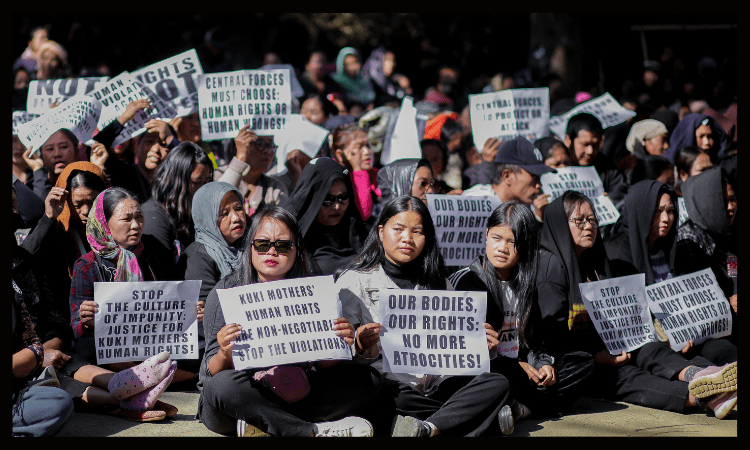Manipur’s Women Describe CRPF ‘Assault’: Lost Eye, Head Trauma, Broken Bones
Kuki-Zo Women Feel Betrayed, Disheartened by Central Armed Forces
By Jyoti Jangra
Commentary
January 11, 2025
Photo courtesy: KSO Media and Documentation Cell
At least 75 tribal girls and women were injured, some grievously, in the Dec. 31 clash with personnel from the Central Reserve Police Force (CRPF) and the Border Security Force (BSF) in Manipur, according to representatives of the Kuki-Zo Women Forum in Delhi. They accuse the central forces of violating operational guidelines by targeting women protesters above the waist. This “mistreatment,” they say, has left them disillusioned with the central authorities.
Personnel from the CRPF and BSF clashed with the women amid ongoing ethnic violence involving the Kuki-Zo tribes and the majority Meitei community in this northeastern state over land rights and identity. The conflict, which began on May 3, 2023, has led to over 250 deaths. It has also resulted in the burning of hundreds of villages and thousands of homes, displacing tens of thousands. The state now experiences almost complete ethnic segregation, with no Kuki-Zo families remaining in the Imphal valley area and no Meiteis in any Kuki-dominated hill regions such as Churachandpur or Kangpokpi.
The incident occurred in the Kuki-Zo village of Saibol in Kangpokpi district, a few kilometres from a “buffer zone” established by the Union Home Ministry. This zone, manned by security personnel, was intended to prevent attacks between the Kuki-Zo and Meitei areas.
Due to the central forces’ alleged inability–despite the buffer zones–to prevent attacks by Meitei armed groups, who are often allegedly accompanied by Manipur police, the Kuki-Zo communities have established bunkers and formed a civilian guard for their protection over the last 20 months. The community in Kangpokpi believes that Saibol’s strategic location makes it a target for Meitei armed groups, as controlling this village could facilitate attacks on several nearby Kuki-Zo villages. Consequently, the bunker at Saibol had become a critical defensive point for the Kuki-Zo.
On Dec. 31, CRPF and BSF personnel attempted to dismantle this very bunker, calling it “illegal,” which prompted protests by Kuki-Zo women. Moreover, the community’s trust in the neutrality of the central forces, particularly the CRPF, was severely undermined due to a recent incident where 10 young Kuki-Zo men were gunned down in what was described as a controversial manner.
At a press conference in Delhi on Jan. 9, 2024, representatives from the Kuki-Zo Women Forum described the nature of the alleged assault by CRPF and BSF personnel on female protesters, who ranged in age from a 14-year-old girl to elderly women.
The security personnel used force, including lathi charges and firing tear gas canisters directly at the women’s faces, the representatives alleged. For example, they said, Lhingkhonei Neishi Mate, 44, lost her left eye and is permanently blind, while many others suffered broken bones and severe injuries, primarily to their upper bodies.
Several women were groped and manhandled in a nearby jungle, the representatives alleged, questioning whether such an extreme response was justified, especially when the women were protesting to protect their community against perceived threats.
Throughout the 20-month-long violent conflict in Manipur, women have often been at the forefront of direct confrontations with central security forces, acting as the first line of soft defence. Kuki-Zo women say they have assumed the role of human buffers, actively working to prevent violent escalations.
The representatives pointed out that while Kuki-Zo women faced brutal violence, Meitei women who obstructed security forces and attempted to snatch weapons in the past were treated leniently. They also noted that despite witnessing violence, arson and attacks by Meitei mobs, central forces have often been absent during critical moments.
The Kuki-Zo tribal community demanded the immediate withdrawal of CRPF and BSF personnel from their areas, along with the establishment of a high-level independent inquiry into the actions of these forces in the Saibol incident.
“So much has happened in Manipur. Our communities are suffering immensely, but why is there no end to this? Why haven’t we been able to stop this?” asked a Kuki-Zo woman, her voice heavy with anguish, as she sat next to me after the press conference.
The Kuki-Zo women do not see themselves solely as victims of ethnic violence but also as survivors of what they call state-enabled atrocities.
At the press conference, they called for justice, accountability, and solidarity—a plea to uphold the dignity and rights of women—mothers, daughters, and sisters—who are also citizens of India.
The Kuki-Zo women representatives referred to their historical contributions to the nation, noting that tribal women resisted British colonial oppression and fought alongside the Indian National Army of Netaji Subhas Chandra Bose. They expressed distress over the current alleged atrocities they face from state and central forces, as well as over being paraded naked, burnt alive, molested and assaulted by Meitei extremists with impunity. They questioned whether they are truly regarded as Indians by the central authorities.

